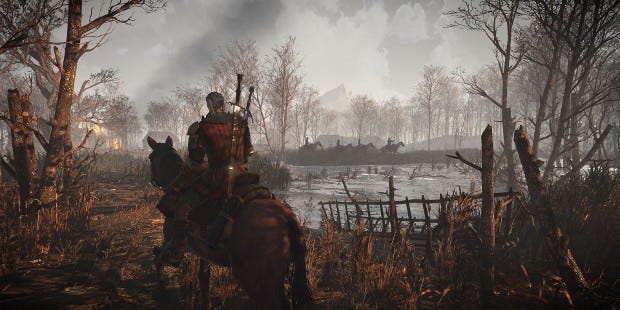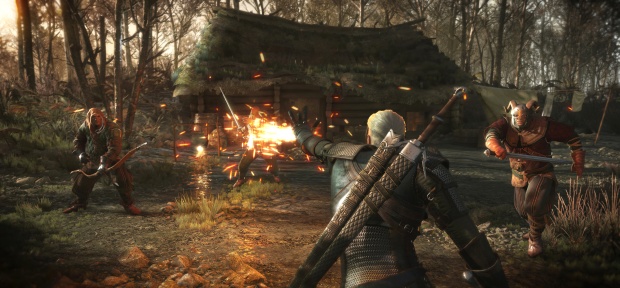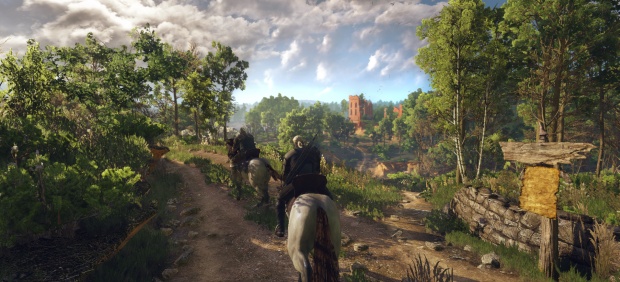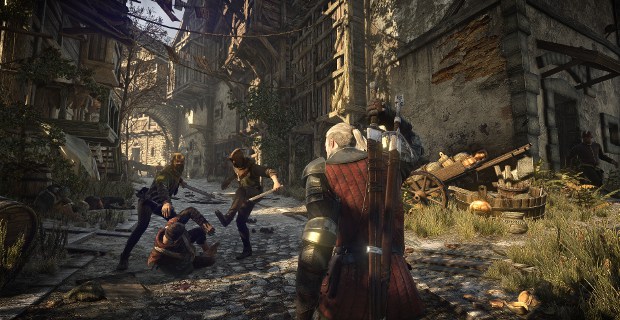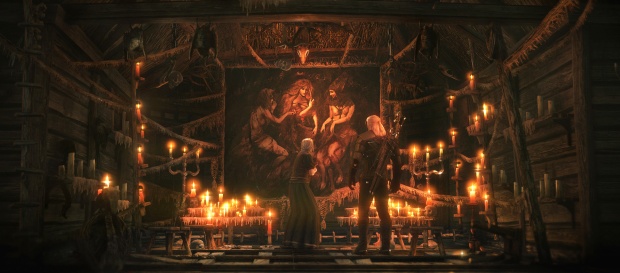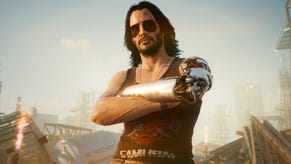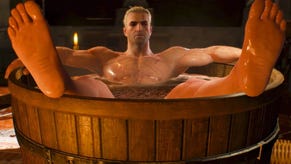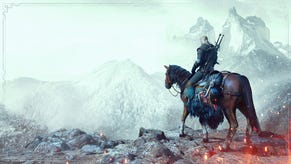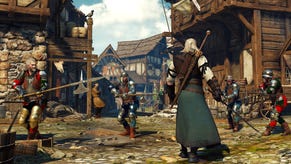Eyes On: The Witcher 3
That witchy twitch
I've been watching somebody chopping monsters into pieces. In a miniature temporary cinema in the chaos of Gamescom, The Witcher 3 is on display, strutting around the place like a peacock. In a forty-five-minute live presentation, it proves itself to be the most handsome game at the show but I'm left wondering what exactly it has to show beneath all the finery. That doesn't mean I want to see its nude collectible sex card but I do want to see what really makes it tick.
Hitman: Absolution is responsible for one of my strangest memories of the last few years of gaming. Despite all of the things that felt like a step (or sprint) back from the emergent farce and thrills of the series' greatest settings, Absolution did one thing better than any other game I'd ever seen before. Crowds. After seeing the herds of potential victims in the Chinatown area, it's hard to look at the small groups that constitute urban life in other games the same way.
Whether The Witcher 3 achieves its loftier goals or not, it will almost certainly serve to spoil the cluster of buildings that often constitute the capital city of a digital fantasy kingdom. Novigrad, the largest city in the game, is enormous. Geralt arrives on horseback and rides by the docks, where boats ply their trade and the cry of the fishmongers can be heard (thanks, Fink).
The scale of the environment is staggering and the NPCs that inhabit it apparently have their own schedules and behaviours. People spend the day going about their business, whatever it might be, and when night falls, they head home or to taverns. It's a living city, at least to some extent, although the visible interactions with the populace either involve nudging them aside, like an Assassin, or receiving quests from them. It's the questing that forms the bulk of the playthrough (watched rather than experienced) and there's little evidence of a dynamic open world.
That's not to say the world isn't impressive. Outside the city, Geralt performs parkour as he scrambles across cliffsides and searches for alternate routes to his objectives. He's able to use his witchy (witchery?) senses to track and hunt, overlaying glowing red foot and claw marks onto the terrain. When he finds his prey, combat is violent, fast and fluid, with special abilities interrupting enemy attacks and tipping the advantage in his favour.
The standout scuffle is against a nest of harpies, which swoop and scratch, threatening to send Geralt tumbling from the precipice he's fighting on. A wrist-mounted crossbow allow him to pick at them from mid-range, or to hit them full-on in the face as they dive. It's the most promising sequence, the splendour of the city aside, showing that quick responses, parrying and dodging are more important than toe-to-toe bludgeoning. The environment comes into play as well, as the deadly dance is performed in loosening circles, with the player struggling to stay on firm ground as attacks and feints cut off his movements and push him toward the precarious cliff-edge.
Fighting human opponents in another area, the environment comes into play again. This time it's in the form of an exploding barrel, which Geralt lights with his Igni fire cone. Sizzle, boom, rain of flesh. It's certainly gory but, in the tradition of exploding barrel kills since time began, it's very convenient and faintly absurd.
It's hard to tell whether The Witcher 3 is embracing that absurdity. The presentation's forty-five minutes involve what feels like forty-seven minutes of dialogue, much of it delivered in a lovely soup of regional British accents. It's all a bit daft, as tales of swords, destinies and corsets tend to be, but even when a godling called Jonny (Dobby the house elf cosplaying as Gollum) provides some light relief among he grim and the grit, the script seems to be almost entirely earnest.
Sample lines - "Do you have bollocks?" and "You need a knight-errant or a witch hunter, not a witcher." I mentioned that line to Graham, unaware of the distinction between a witch, one who witches and a witch hunter. He suggested witchers might have unionised their slaying, creating a division between them and the strike-busting witch hunters. Seems likely.
My occasional aversion to fantasy lore aside, there's a pleasing fairytale quality to Geralt's hunts. He's not punching orcs, he's seeking half-forgotten creatures and dangerous rumours. Rumours with teeth and a bulbous eyes. And he's doing it in one of the most beautifully detailed environments I've ever seen. It's stunning to look at, both in terms of its preposterous scale and the intricacy of every texture, tree and living thing. It's a place that I want to spend time in but, despite the open world claims, on the evidence of this short visit it's a place in which time is spent listening to instructions, following quest markers and hitting things until the die.
There are alternate routes to find, I've seen that with my own eyes, but the destination has always been a verbose quest-giver or an angry monster. There's no single moment, outside the city walls, that makes the extravagant world seem like more than a backdrop for a series of encounters. The order they occur in will vary as players explore as they see fit rather than being pushed in a specific direction but despite the beauty of the place, it may not contain as much surprise, improvisation and mystery as the most convincing fictional spaces.
For one moment, as Geralt traipsed through a swamp, ominous stomping flooded out of CD Projekt's meaty bass system. Local wildlife, large, we were told. It sounded bloody enormous and didn't appear to be related to any current quest. And apparently it wasn't because instead of encountering the source of the sound, or even turning around to look at it, we were plunged into another dialogue-heavy cutscene, at which point the mystery interloper apparently ceased to exist.
Maybe that's the moment that made me so grumpy. It's understandable that a live demonstration shows certain highlights and hits the right beats, but when so much of the conversation around the game is about freedom, it's disappointing to have the one moment when something unexpected threatens to emerge onto the prescribed path be cut short for the sake of another cutscene.
I'm judging the presentation rather than the game because that's all I can judge at the moment. It left me with the suspicion that the wonders of the world might be window-dressing for a series of fights and fetch quests rather than a thing to be enjoyed in its own right. If that's the case, it will at least be the best window-dressing that a window ever wore, but it would have been reassuring to see something other than running, jumping and killing.
And then I remember the city. If nothing else, The Witcher 3 will have Novigrad and every other game that tries to fob us off with Tinyside-on-Twee when we're supposed to be seeing the greatest kingdom in the world, or a bungalow in place of New York, may well be at least a little ashamed.
Gripes and doubts aside, there's no doubt that I'll want to experience the streets and the docks for myself next February. And I might even enjoy a spot of hunting as well, exploring the dark places of the world. At the moment, the visuals and technical accomplishment of the environments set the game apart from just about anything else, and that might be enough, if there is enough variety in the bestiary and locations.
There are also, of course, the decisions that cause the plot and its subplots to branch, changing the world in ways great and small. The tightly packaged presentation ends with a choice – to stab a tree in the heart or not to stab a tree in the heart. In this playthrough, Geralt went sword-happy and the blood flowed, causing the children at a local orphanage to vanish from the world. There's a reason, a connection between those things, because we are in the realm of folklore and fairytale, where ancient beings protect and harm depending on the actions of men like Geralt who slice through the threads of destiny.
It might be brilliant and if it is, I'll happily eat these words with a side of humble pie. Perhaps if it were being described as a bigger, bolder Witcher 2, I wouldn't be voicing these doubts, but this is described as a different kind of game, or at least a different kind of world. On the evidence I've seen though, The Witcher is talking the heavily-accented Welsh talk but it's not yet convincingly walking the walk. I'd love to be proved wrong.
